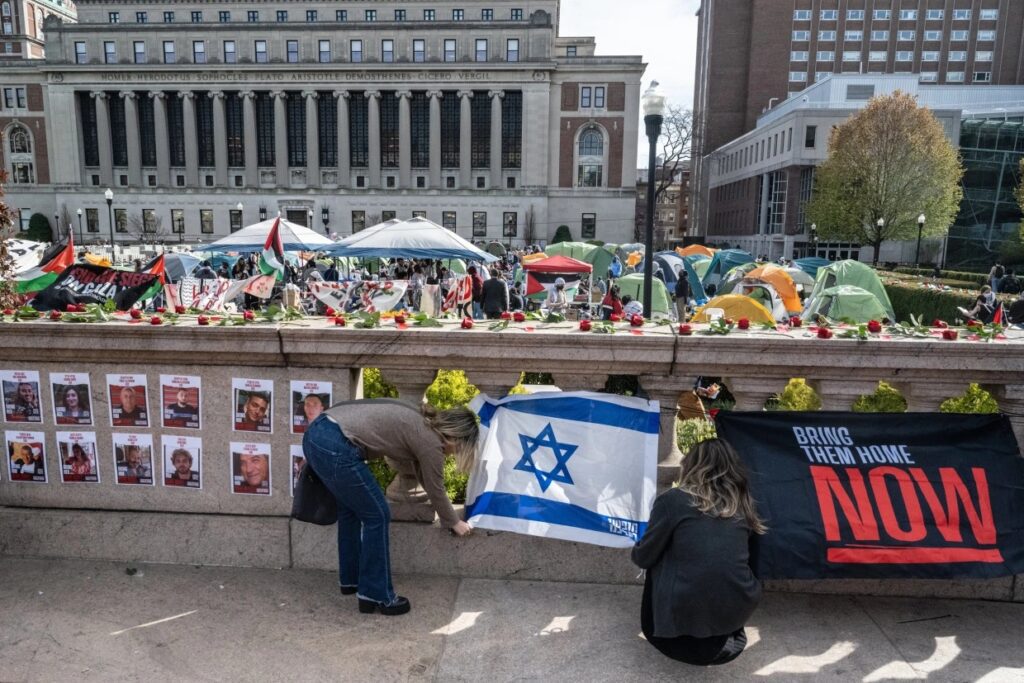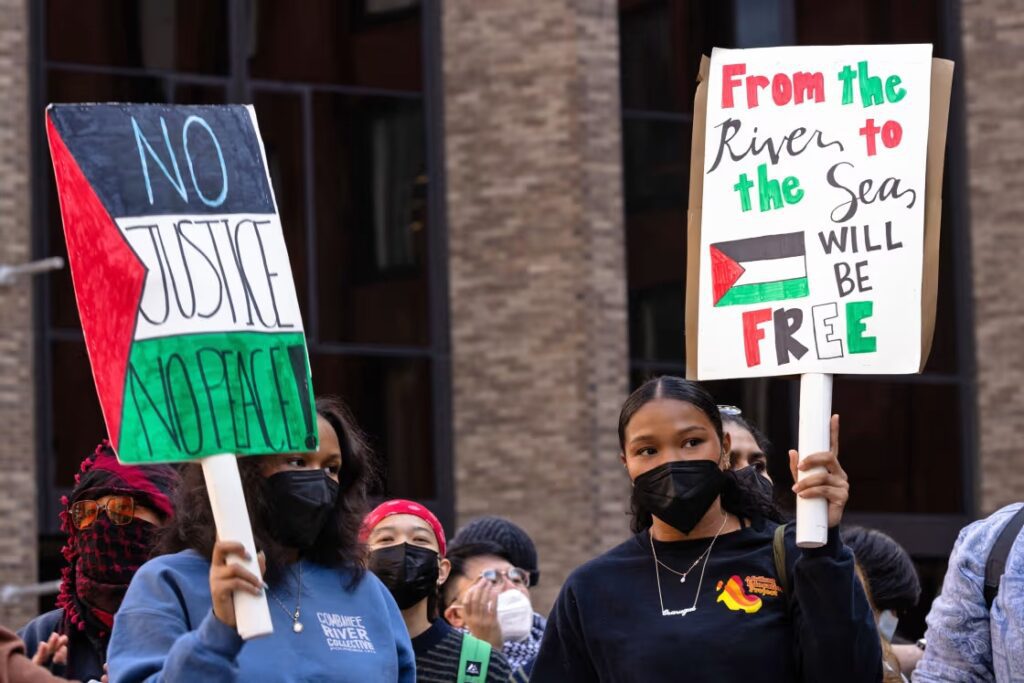Jewish and pro-Palestinian students at Columbia University accuse school officials of discrimination in competing complaints
Escalating protests over Israel’s military operation in Gaza have become deeply personal for students at the elite university who say administrators are failing to protect them.
By Alicia Victoria Lozano and Melissa Chan
On April 29, 2024

Students at Columbia University have filed dueling discrimination complaints as confrontations between pro-Palestinian protesters and counterprotesters continue.
Combined, the two complaints underscore how political tensions over Israel’s military operations in Gaza since Hamas’ terrorist attack on Oct. 7 have become personal for thousands of students in the U.S.
A class action lawsuit filed Monday in the Southern District of New York accuses the university of violating safety protocols by allowing “extremist protesters” to intimidate Jewish students and “push them off campus” because of safety concerns.
A separate complaint filed Thursday with the Education Department’s Office for Civil Rights accuses the university of failing to protect students “who have been the target of extreme anti-Palestinian, anti Arab, and Islamophobic harassment on campus since October 9, 2023.”
The harassment includes receiving death threats, being called “terrorists” and other slurs, experiencing harassment while wearing keffiyehs or hijabs and being the targets of doxxing campaigns, according to the complaint.
Columbia students first set up protest encampments on April 17 calling for the university to divest from companies tied to Israel’s military operations in Gaza. Within days, the New York City-based protest spread to campuses across the country, sparking hundreds of arrests and drawing the attention of national and international leaders.
On Thursday, after more than 100 people were arrested at protests at Columbia, Palestine Legal, a Chicago-based advocacy group, filed its complaint demanding an investigation into what it calls the university’s “discriminatory treatment of Palestinian students and their allies.”
The complaint filed Monday on behalf of several Jewish students requests an emergency injunction requiring Columbia trustees to better enforce the school’s code of conduct to allow class members to safely complete the semester in person.
“Indeed, despite its supposed commitment to diversity, equity, and inclusion, Columbia has allowed a small group of fringe demonstrators to target Jewish students and faculty with harassment, hate speech and violence for the sole reason that they are (or appear to be) Jewish. Columbia’s inaction and willingness to allow for such vile conduct is antithetical to fostering an environment of diversity, equity, and inclusion,” according to the complaint.
“Since its formation, the encampment has been the center of round-the-clock harassment of Jewish students, who have been punched, shoved, spat upon, blocked from attending classes and moving freely about campus, and targeted by pro-terrorist hate speech,” the complaint reads in part.
The plaintiffs seek a jury trial and unspecified punitive damages.
University officials did not immediately respond to a request for comment about the complaints. Last week, the school began offering virtual learning options for students.“I know that many of our Jewish students, and other students as well, have found the atmosphere intolerable in recent weeks. Many have left campus, and that is a tragedy,” university President Minouche Shafik said in a statement Monday. “To those students and their families, I want to say to you clearly: You are a valued part of the Columbia community. This is your campus too. We are committed to making Columbia safe for everyone, and to ensuring that you feel welcome and valued.
Shafik’s statement did not mention Muslim students or Islamophobia.
Antiwar protesters have cautioned against conflating criticism of Israel’s military operations in Gaza with hate speech. Demonstrators have posted signs at the encampment outlining policies for treating everybody, including counterprotesters, with respect. Their ultimate message, according to student activists, is one of peace.
But as demonstrations have escalated, both Jewish and Muslim students have said they feel targeted because of their beliefs.

Some Jewish students told NBC News that they moved off campus or no longer wear items that identify their faith after having been spit on, shoved and harassed. Some Palestinian students say they have been targeted while wearing hijabs or keffiyehs.Columbia student Maryam Alwan said in a statement included in Palestine Legal’s complaint: “As a Palestinian student, I’ve been harassed, doxxed, shouted down, and discriminated against by fellow students and professors — simply because of my identity and my commitment to advocating for my own rights and freedoms.
“I’m horrified at the way Columbia has utterly failed to protect me from racism and abuse, but beyond that, the university has also played a role in this repression by having me arrested and suspended for peacefully protesting Israel’s genocide in Gaza,” she added.
It is difficult to quantify what some have described as a rise in antisemitism and Islamophobia on college campuses. Columbia, which has been a hotbed of protest activity, declined to provide numbers on reported incidents.
Itai Dreifuss, 25, a junior studying financial economics and neuroscience, served in the Israeli Defense Forces for nearly three years until 2020. Columbia was the only school he applied to after he completed his service. “If it wasn’t going to be Columbia, I didn’t want to go to college,” he said.
His school pride dimmed as confrontations between students supporting the people of Gaza and those supporting Israeli forces escalated.
Dreifuss, who is not involved in the lawsuit, said that in one instance, shortly after the war started in October, he was walking with an Israeli friend near the campus library speaking in Hebrew when a man spit on his back.
“It took me a second to realize,” Dreifuss said, adding that he turned to ask the man whether he had spit on him intentionally.
Dreifuss said the man kept repeating, “I know what you’re saying.” He said the man then muttered under his breath that “I would kill you” if they were not in a pair.
“I was just shocked that entire time,” he said.
In another incident, Dreifuss said, a man on Columbia’s campus pulled out a Hamas flag and waved it in his face as he and his friends sang songs of peace.
“He just looked at me and said: ‘Let’s go, Hamas! Let’s go, Hamas!’” Dreifuss said, adding that it was not clear whether the man was a student. “He was in our faces, trying to get a reaction.”
Dreifuss said that his friends sought help from the police and the school’s public safety officers but that they did not receive any support.
“We went to the NYPD, and we went to public safety. Both the physical public safety officers and the office, and nothing,” he said. “There’s nothing to do. They said they couldn’t help with that.”
Campus public safety officials did not respond to a request for comment on the incident.
A New York police spokesperson said the agency does not track data or complaints specific to the university.
Antisemitism has been rampant across the U.S. since October, according to the Anti-Defamation League. The human rights group said it recorded 3,291 incidents from Oct. 7 to Jan. 7, including assault, vandalism, written and verbal harassment and hate speech.
Anti-Muslim hate incidents — such as employment and education discrimination, hate speech and physical assaults and threats — have also increased, according to the Council on American-Islamic Relations. The nonprofit advocacy group said it received 8,061 complaints nationwide last year, the most in its 30-year history. Nearly half of them were reported in the final three months of the year, the group said.
Chaya Droznik, 22, a junior at Columbia who is not part of the lawsuit, said a demonstrator recently told her that “Oct. 7 is about to be every day for you guys.”
Supporters of the antiwar movement say the antisemitism some students described is not indicative of their broader message. Many of the protesters camped out at universities across the country are Jewish and have hosted large Seders and other actions to denounce Israel’s assault on Gaza.
Cameron Jones, an organizer for Jewish Voices for Peace at Columbia who has been a visible presence at the protest encampment, said he has not experienced antisemitic harassment. His group, which does not support the Zionist movement, observed Passover and Shabbat at the encampment.
“I am a Jewish student right here. I am very present in this environment, and, as a Jewish person who is an organizer for Palestinian liberation on campus, I have felt nothing but safety and love being involved in these spaces,” he said.
Doctoral student Nadia Ali, who is calling for a cease-fire in Gaza, denounced antisemitism and said antiwar messages are increasingly confused with hatred for Israel.
“Palestinians would be the first to relate to that pain,” she said. “It is unacceptable to feel unsafe on campus. But it is important not to conflate the call for justice and peace with antisemitic actions or hate speech.”
This piece was republished from NBC News.